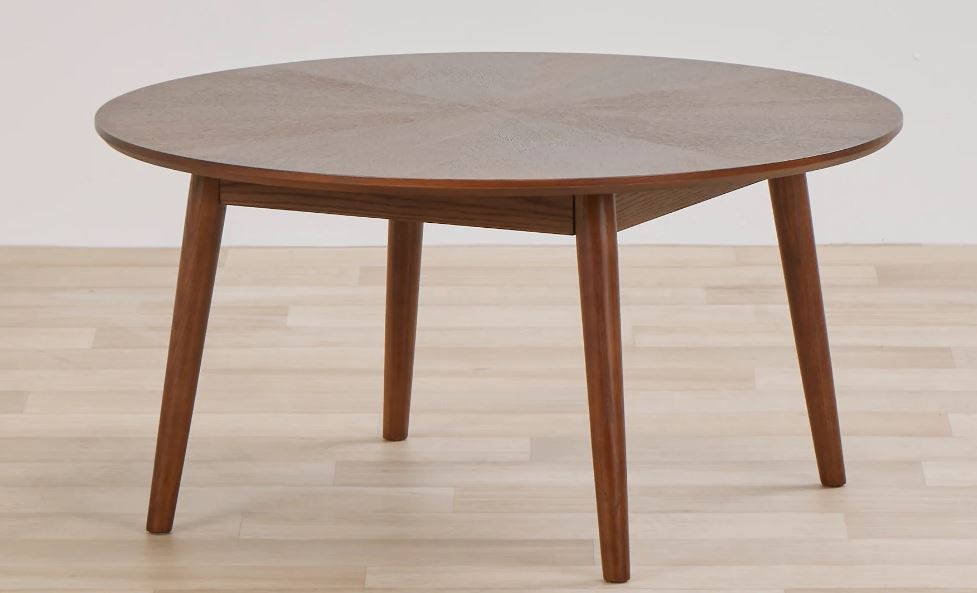The Nood Coffee Table, which serves as a subtly assured anchor in innumerable homes, has accomplished the remarkable feat of fusing form, function, and familiarity. Its appeal goes well beyond its main function as a surface; like a maestro leading an orchestra, it curates the area around it and sets the room’s aesthetic tone. This piece, which subtly asserts presence without ever demanding attention, defines a space for people who value intentional living rather than merely furnishing it.
The emergence of function-forward design has been particularly apparent in recent years as consumers have become more picky about what they buy. The Nood Coffee Table‘s remarkably straightforward design and well chosen materials perfectly capture this change. Every variation, from the glass-topped Replica Noguchi to the ash-finished Arthur model, fulfills a different function while continuing to be a part of a larger story that is based on the principles of sustainable design, emotional utility, and quiet luxury.
Nood Coffee Table Product Line Overview
| Model Name | Finish Options | Dimensions | Price Range (NZD) | Defining Feature | Link for Reference |
|---|---|---|---|---|---|
| Arthur Coffee Table | Ash, Black | 61cm, 81cm diameter | $399 – $599 | Understated circular design, matte finish | Arthur Table – Nood |
| Replica Noguchi Table | Ash, Walnut | One size | $1,999 – $2,199 | Iconic glass and sculptural base, mid-century influence | Noguchi Replica – Nood |
| Rhys Coffee Table | Oak, Walnut | One size | $999 | Starburst wood grain pattern, Scandinavian profile | Rhys Coffee Table – Nood |
| Silas Coffee Table | Black, Oak | One size | $599 | Sleek, modern lines; suitable for nesting with companion tables | Silas Coffee Table – Nood |
| Orlando Coffee Table | Dark Ash, Oak | Round or Square | $239 – $269 | Entry-level option, particularly affordable and neutral-friendly | Orlando Table – Nood |
Many homeowners are emphasizing emotional comfort in addition to style by incorporating these tables into their living areas. An Auckland designer, for instance, recently shared how a Rhys coffee table with its glowing oak grain transformed her open-plan lounge into a “sun-washed sanctuary,” citing the unexpectedly grounding tactile warmth it provided. Customers who are switching from trend-hopping to timeless investment are increasingly echoing this sentiment.
The need for design elements that could easily adjust to shifting needs surged during the pandemic, when living rooms became multipurpose gathering places. This need was met by Nood’s coffee tables, especially the modular Silas and Orlando models, which are both aesthetically pleasing and incredibly functional. Their ability to be temporarily moved, combined with side tables, or rearranged has proven to be very effective for people who are adjusting to changing living arrangements.

Because each design seems to anticipate what a home might need next, one could argue that Nood coffee tables’ success is due to their emotional intelligence. Despite its high price, the Replica Noguchi has continuously drawn customers who view it as an heirloom-worthy artifact in addition to furniture. In addition to paying homage to Isamu Noguchi’s sculptural sensibility, this incredibly inventive recreation of a design classic offers modern finishes that blend in with today’s organic-modern interiors.
Utilizing superior craftsmanship, the brand has made sure that its pieces are incredibly durable, which is a quality that is particularly appreciated in homes with kids or pets. For instance, the Arthur table has received great praise for its sturdy design and scratch-resistant surface. These qualities are not only practical in day-to-day use, but they also inspire confidence.
Living areas have evolved over the last ten years from staged showrooms to carefully chosen representations of individual identities. A coffee table is no longer an afterthought; rather, it is the focal point around which the personality of the space is developed, as demonstrated in the homes of interior influencers like Athena Calderone and Leanne Ford. Nood’s creations, whether they be books, ceramics, or fresh flowers, blend in perfectly with this story and frequently serve as the base for layered design.
Additionally, Nood has made significant progress in the field of sustainable design. The brand is in line with wider environmental priorities thanks to its use of FSC-certified wood, minimal packaging, and durable finishes. These options feel especially advantageous to customers who are sensitive to climate change because they combine responsibility and style without sacrificing either.
Nood has maintained its authenticity while broadening its market reach through strategic partnerships with regional makers and design collectives. These collaborations have influenced the development of product lines that feel both locally rooted and globally relevant. It’s a model that reflects the methodical, cooperative, and transparent growth of artisanal fashion brands or boutique wineries.
Customer feedback regarding ordering simplicity, delivery speed, and after-purchase care has significantly improved since they started using an online-first business model. Despite being digitally driven, the experience maintains a human feel because of user-submitted images, carefully chosen imagery, and evocative descriptions. This careful approach has turned one-time customers into loyal ones and has become a differentiator.
For many young professionals furnishing their first apartment or families revamping a communal area, the allure of the Nood Coffee Table lies not just in its appearance but in the whole experience. These tables are a part of important daily routines, from unpacking to arranging, from appreciating the wood grain to sharing wine on a Friday night. Their design’s understated assurance serves as a reminder that when beauty is carefully incorporated into functionality, it has a far greater lasting impact than fads.
